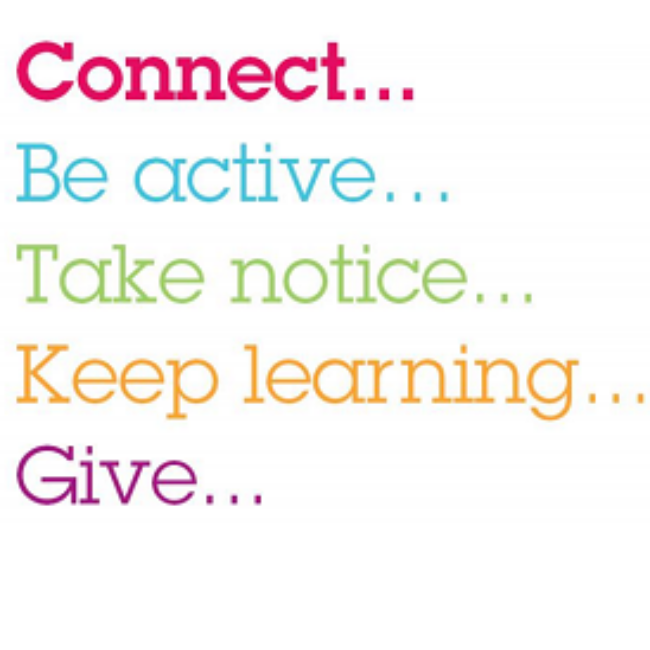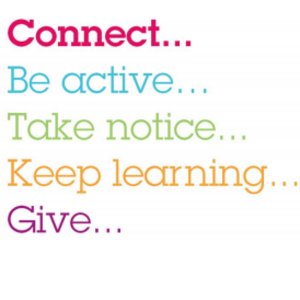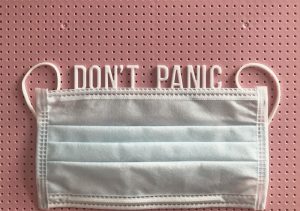
A review of the most up-to-date evidence found that building just five actions into our daily lives can increase wellbeing. Here I discuss 5 ways to wellbeing activity ideas.
The 5 ways to wellbeing activity ideas are:
- Connect
- Be Active
- Take Notice
- Keep Learning
- Give
At the most recent seminar of the Resilience and Wellbeing Network, we asked members to list the activities and practices that they felt were contributing to their wellbeing.
By sharing these we hoped we could inspire each other to try new things.
I’ve looked at the list and compared it to Nef’s research. The results were really interesting.
From the practices that members contributed to the flipchart, we can see the areas that most of us consider are adding to our wellbeing.
Be active
The most common activities listed were to do with being active. Such as: running or walking at lunchtime, walking with my best friend catching up, some kind of sport daily, walking the dog. As NEF note, exercise is essential for wellbeing – although whether this is because the exercise has an influence on feelings of wellbeing, or because feeling well makes people more likely to exercise, is unclear. Evidence does suggest that even small changes in people who are sedentary – such as just 10 minutes of activity – can have a significant effect on mood. So if you spend all day sitting at your desk, there is a strong incentive to get up and go for a brisk walk.
Take notice
Many people listed practices that help them take notice of the world, and how they are feeling. Taking some reflection time, writing in a journal, meditation, mindfulness, noticing things in nature every day.
Evidence suggests that being in a state of “mindfulness” – or paying attention to what is happening in the present – can increase self-regulated behaviour and self-knowledge. This self-regulatory behaviour is thought to be important for wellbeing.
Connect
The third most popular way to enhance wellbeing was to connect with the people around you. Members said they make sure they say morning to people, talk to their teams to find out what is really happening, check in with a mentor, or talk to friends.
Perhaps most of us connect without even thinking about it. We talk to family, friends, colleagues and neighbours. But if we get isolated from our support networks, at home or work, or if we don’t feel connected to our community, our wellbeing can quickly suffer. Nef says: “Social relationships are critical for promoting wellbeing and for acting as a buffer against mental ill health.”
Surveys show that strong social networks promote a sense of belonging and wellbeing. There are two ways of thinking about social connections – a broad social network where we socialise with lots of different people provides feelings of connectedness to our community and can enhance self-worth. The deeper relationships we have with close friends and family can provide support, encouragement and give meaning to life. We need a balance of both – strong and broad social networks – for our wellbeing. Nef says: “Think of these as the cornerstones of your life and invest time in developing them. Building these connections will support and enrich you every day.”
Combining two or more practices – by going for a walk and taking notice of the world around you, or walking with a friend to connect and catch up – seems a good way of squeezing in more wellbeing time into our busy days.
Keep learning
Two of the ways to enhance wellbeing that Nef considers important were not really covered by the examples given by members. These were “Keep learning” and “Give”. It might be that we just don’t think of these in terms of our own wellbeing. The evidence gathered by Nef shows that trying something new, or rediscovering an old interest, can increase confidence as well as being fun. The activity of learning in itself, as well as setting a goal and then achieving it, has a positive impact.
Give
By giving – doing something nice for a friend or stranger, volunteering or joining a community group – we link our happiness to that of the wider community. This can be incredibly rewarding and helps to create connections with the world around us. It might just be thanking someone, smiling, or letting someone go ahead of us in the queue – even these small gestures can build wellbeing. Research has shown that an act of kindness once a week for six weeks is associated with an increase in happiness.
Can you think of other practices and activities that you would recommend to others that come under the umbrella of “Keep learning” or “Give”?
Read the full report by NEF: Five Ways to Wellbeing.
If you or your organisation are looking to prioritise employee wellbeing, you may be interested in support services we offer to client. You can find out more about cultivating better employee wellbeing here.
For more information on our courses, please contact us through our contact form.











